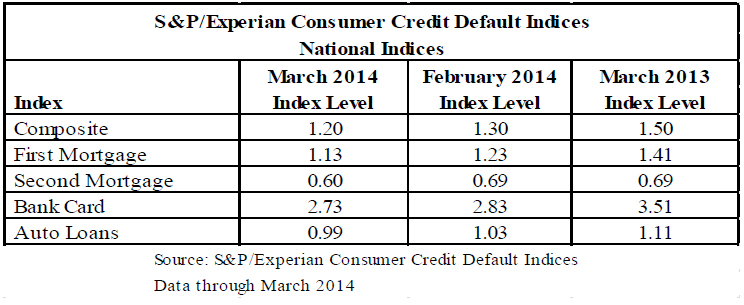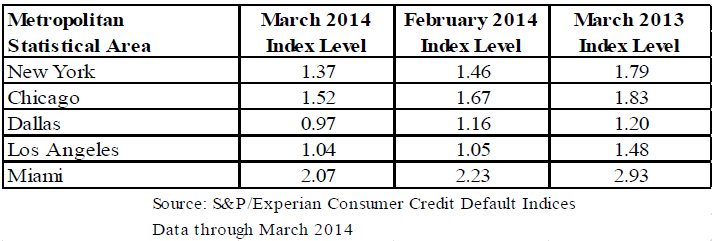The WPJ
THE WORLD PROPERTY JOURNALReal Estate Facts Not Fiction
Residential Real Estate News

U.S. Consumer Mortgage Defaults Lowest Since 2006
Residential News » North America Residential News Edition | By WPJ Staff | April 15, 2014 10:30 AM ET
According to the latest S&P/Experian Consumer Credit Default Indices for March 2014, there was a decline in national default rates, and all five national indices showed a drop-off for the second consecutive month.
The national composite recorded its lowest post- recession rate; it posted 1.20% in March, the lowest rate since July 2006. The first mortgage default rate was 1.13% in March, its lowest level since September 2006. The second mortgage posted 0.60% in March, down from 0.69% in February. Both the auto loan and bank card recorded new historic lows in March 2014; the auto loan default rate was 0.99% and the bank card rate was 2.73%.
"Along with signs that the economy is improving, consumer credit default rates continue to gradually decline", says David M. Blitzer, Managing Director and Chairman of the Index Committee for S&P Dow Jones Indices. Across all categories, default rates improved as the auto loan and bank card sectors reached historic lows. Economic reports confirm these improving trends. Gains were made in consumer confidence and the labor market as a result of fewer applicants filing for unemployment benefits. Retail sales also increased in March with online spending leading the way ahead of the upcoming holiday. Increasing jobs and growing income if upheld will provide a major boost to consumer spending. Consumer default rates have stabilized at levels similar to those seen before the financial crisis.
"Possible areas of concern are reports of increases lending for car purchases to less credit worthy borrowers as well as the continued rise in student loans.
"All five of the cities saw default rate decreases. Los Angeles continued it's downwards trend, recording 1.04%, the lowest default rate seen since July 2006. Dallas recorded the largest downturn; it posted 0.97% in March, 19 basis points lower than last month's level. Miami experienced the largest decrease year-over-year; it posted 2.07% in March 2014, down 86 basis points from the 2.93% rate in March 2013. Miami continues to maintain the highest default rate while Dallas has the lowest. All five cities - Chicago, Dallas, Los Angeles, Miami and New York - remain below default rates they posted a year ago, in March 2013."


Sign Up Free | The WPJ Weekly Newsletter
Relevant real estate news.
Actionable market intelligence.
Right to your inbox every week.
Real Estate Listings Showcase
Related News Stories
Residential Real Estate Headlines
- More Americans Opting for Renting Over Homeownership in 2024
- BLOCKTITLE Global Property Tokenization Platform Announced
- Small Investors Quietly Reshaping the U.S. Housing Market in Late 2024
- Greater Miami Overall Residential Sales Dip 9 Percent in November
- U.S. Home Sales Enjoy Largest Annual Increase in 3 Years Post Presidential Election
- U.S. Housing Industry Reacts to the Federal Reserve's Late 2024 Rate Cut
- U.S. Home Builders Express Optimism for 2025
- Older Americans More Likely to Buy Disaster-Prone Homes
- NAR's 10 Top U.S. Housing Markets for 2025 Revealed
- U.S. Mortgage Delinquencies Continue to Rise in September
- U.S. Mortgage Rates Tick Down in Early December
- Post Trump Election, U.S. Homebuyer Sentiment Hits 3-Year High in November
- Global Listings Aims to Become the Future 'Amazon of Real Estate' Shopping Platform
- Greater Las Vegas Home Sales Jump 15 Percent in November
- Ultra Luxury Home Sales Globally Experience Slowdown in Q3
- World Property Exchange Announces Development Plan
- Hong Kong Housing Market to Reach Equilibrium in Late 2025
- Construction Job Openings in U.S. Down 40 Percent Annually in October
- U.S. Mortgage Applications Increase in Late October
- World Property Markets, World Property Media to Commence Industry Joint-Venture Funding Rounds in 2025
- New Home Sales Hit 2 Year Low in America
- U.S. Pending Home Sales Increase for Third Consecutive Month in October
- Pandemic-led Residential Rent Boom is Now Fizzling in the U.S.
- Emerging Global Real Estate Streamer WPC TV Expands Video Programming Lineup
- 1 in 5 Renters in America Entire Paycheck Used to Pay Monthly Rent in 2024
- U.S. Home Sales Jump 3.4 Percent in October
- Home Buyers Negotiation Power Grows Amid Cooling U.S. Market
- Canadian Home Sales Surge in October, Reaching a Two-Year High
- Greater Orlando Area Home Sales Continue to Slide in October
- U.S. Mortgage Credit Availability Increased in October
- U.S. Mortgage Rates Remain Stubbornly High Post Election, Rate Cuts
- Construction Input Prices Continue to Rise in October
- BETTER MLS: A New Agent and Broker Owned National Listings Platform Announced
- Home Prices Rise in 87 Percent of U.S. Metros in Q3
- Caribbean Islands Enjoying a New Era of Luxury Property Developments
- The World's First 'Global Listings Service' Announced
- Agent Commission Rates Continue to Slip Post NAR Settlement
- Market Share of First Time Home Buyers Hit Historic Low in U.S.
- Greater Palm Beach Area Residential Sales Drop 20 Percent Annually in September
- Mortgage Applications in U.S. Dip in Late October
Reader Poll
Marketplace Links
This website uses cookies to improve user experience. By using our website you consent in accordance with our Cookie Policy. Read More





